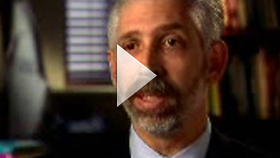Could You Have Obstructive Sleep Apnea?
Symptoms of Apnea (0:27)
Lawrence J. Epstein, MD, of Harvard, explains the three classic features of obstructive sleep apnea.
Overweight middle-aged men have the highest risk of developing obstructive sleep apnea (OSA), a disorder that disrupts breathing during sleep. Obstructive sleep apnea affects women, too, most commonly after menopause. It even affects babies and children, particularly those who have enlarged tonsils, or are overweight.
Excess weight boosts a person's risk of developing obstructive sleep apnea. Excess fat not only envelopes the outside of the body but also surrounds tissues inside the body. Excess fat on throat tissues increases the likelihood of airway blockage. Certain inherited traits, such as a small jaw or a large overbite, may increase the risk of developing obstructive sleep apnea. Consuming alcohol near bedtime may further worsen breathing while sleeping in people with obstructive sleep apnea.
While an estimated 18 million Americans have obstructive sleep apnea, many do not realize they have it. They understandably don’t know they have symptoms that occur only in sleep. A family member or bed partner may be the first to recognize their problem snoring, fatigue, and other symptoms:
- Do you snore loudly?
- Do you often feel sleepy or foggy while awake?
- Has someone told you that you stop breathing or choke or gasp in your sleep?
- Are you overweight?
If you answered “yes” to these questions, you have symptoms that suggest you may have obstructive sleep apnea. You can find out more about your risk for obstructive sleep apnea by filling out the Anonymous Sleep Disorders Screening Tool.
Discuss your symptoms with a healthcare provider. This person may refer you to a sleep specialist for further evaluation. If you do have obstructive sleep apnea, treatment can help you sleep better, feel better while awake, and perform well in your safety-critical railroad job.
"A guy that I worked with came in with a line on his face, and we started talking about that. He told me about his mask, and we started talking about snoring and everything else, and I thought wow, you know, I think I have it. And then I went in for a sleep study. I’ve been on the CPAP machine since 2000. If I don’t use my machine, my sleep is terrible. I have a machine at home, and another that I leave at my away-from-home terminal."

